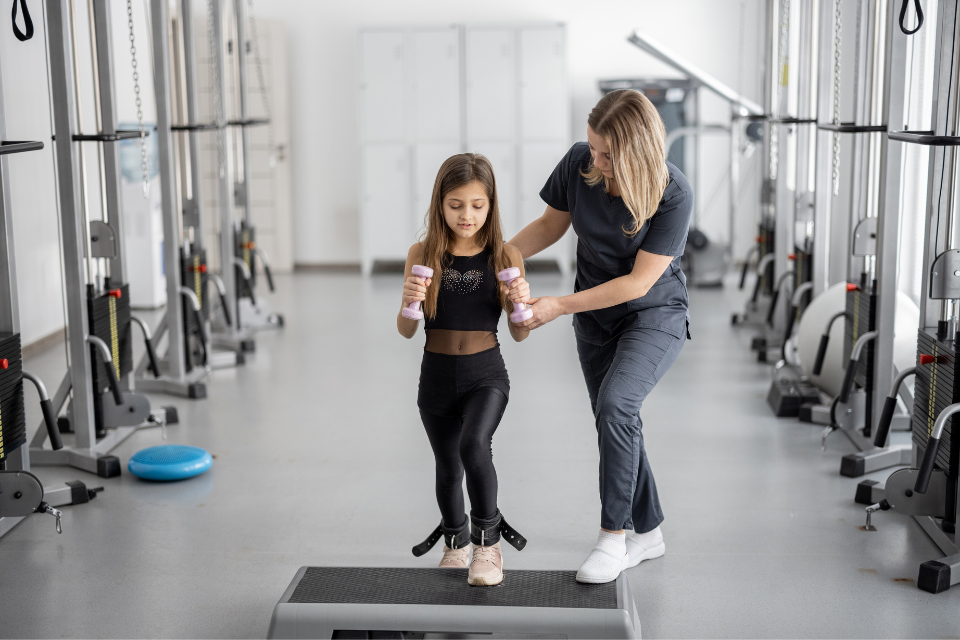Do “disability” and “healthy” sound mutually exclusive? They shouldn’t be. An impairment to one physical or mental function doesn’t render the whole body useless: if anything, other functions become more effective as they’re exercised to compensate.
Still, if the person with the disability is your own child, it’s tempting to overprotect them by limiting their freedom of movement. Or if you have a recently discovered disability, your first impulse may be to withdraw into self-pity, rejecting all suggestions for managing the situation: “Things will never be the same, so why bother even trying?” (Important note: If you have active thoughts of ending your life, you need more help than a blog post can give. See a doctor or call the 988 suicide hotline immediately.)
It’s true that disabilities, whatever their specific nature, place a person at higher risk for additional health problems. Far from being an excuse for fatalism, this should serve as incentive to take extra care of one’s health. If your child has a compromised immune system, the last thing he needs is to increase its workload by becoming obese.
Physical Habits
With a nod to September as National Childhood Obesity Awareness Month, it’s worth remembering that healthy weight is also a major factor in preventing disabilities such as heart trouble, breathing problems, and diabetes. In our over-sedentary world, at least 20 percent of the U.S. child population is now obese—and many children are painful living proof that you’re rarely too young for a high-blood-pressure diagnosis.
When there’s disability in the family, staying actively healthy seems all the harder—but it’s never impossible. Ask your pediatrician, your educational therapist, and your child herself for recommendations on adjusting the following healthy habits to accommodate mobility impairments, sensory issues, allergies, or other difficulties.

Food and drink:
- Include protein, fiber, and natural vitamins on everyone’s daily menu.
- Save processed and drive-through foods for special occasions. Avoid using less-than-healthy “comfort foods” as a quick pickup or a good-behavior bribe.
- Where food intolerances (including texture/flavor sensitivity) are a problem, get medical advice planning the affected person’s diet.
- Especially where someone has digestive difficulties, remember that food is metabolized better when consumed in smaller, more frequent portions. There’s nothing wrong with between-meal snacks if the snacks are healthy and the meals of moderate size.
- If a disability puts someone at risk for becoming underweight, never try to “fatten them up” with sugar- and white-flour-based snacks: besides being unhealthy in themselves, these foods rely on “empty calories” that provide no long-term weight-gain benefits. Nutritious fatty foods include nuts, seeds, avocado, whole-milk dairy products, and olive- or canola-oil-based condiments.
- If your children leave healthy food on their plates, perhaps it’s because you’re overwhelming them with adult-size servings. Try giving them smaller helpings, and offering “seconds” when these are finished.
- Remember to stay hydrated as well. Plain old water is nearly always the best drink (check local recommendations on whether to filter it).

Sleep:
- Manage your evening schedules so everyone has time to wind down before official bedtime.
- Try to keep non-sleep-related activities, especially electronic screens, out of bedrooms even in daytime.
- Make bedrooms as comfortable as possible. Most people sleep best in a cool, dark environment—but remember to consider individual needs, especially where neuro-atypical conditions are involved.
- If someone has real sleep difficulties, consult a doctor: additional disability accommodations, or special counseling, may be needed.
Activity:
- Give your kids freedom to invent their own games and use their imaginations. They’ll get more exercise, and you’ll be less stressed after abdicating the role of activity coach.
- If your children have “stimming” (fidgeting) tics, appreciate that they’re getting more exercise than their quieter peers. Even aside from the more vigorous stimming habits (hand flapping, spinning in place), fidgeting burns a few hundred calories a day. It may even be associated with longer life.
- Where mobility impairments are a concern, consult your local Easterseals office or community center about fitness programs/equipment/apps designed for users with disabilities.
- Remember, also, that fitness activities aren’t limited to exercises that strain heart and lungs. Try daily walks, or regular stretching exercises (such as tai chi or yoga).
Mental Stimulation and Emotional Gratification
Finally, remember that what’s good for your physical health is good for your mental health, and vice versa. However impeccable your physical habits, being chronically negative, glum, and lonely has major detrimental effects.
Get professional counseling if serious depression is involved. And add the following to your “healthy habits” list:
- Count your blessings every day. Consider keeping a “gratitude journal.”
- See life in proper perspective. Chances are that many things which “drive you crazy” aren’t really that serious.
- Nurture your sense of humor: read or watch something funny every day. (All the better if it was written by someone with concerns similar to yours.) Or just laugh loud and long for no reason except the exercise.
- Exercise the brain. Reading, art projects, and puzzles all keep your mind sharp—and also give you something to concentrate on besides your problems. There are also “brain games” apps for every age and stage of life.
- Nurture your family (and other human) relationships to nurture your whole self. Offer your loved ones unconditional acceptance (even on days when you long for a more “typical” child) and permission to talk to you about anything.
- Effective relationships also mean respecting others’ uniqueness and preferences. Learn and speak your children’s individual “love languages.” It isn’t guaranteed easy (especially where communications disabilities are involved), but it will pay enormous dividends for everyone, in every aspect of health.
See also: Recommended childhood-obesity, fitness, health, and weight apps

